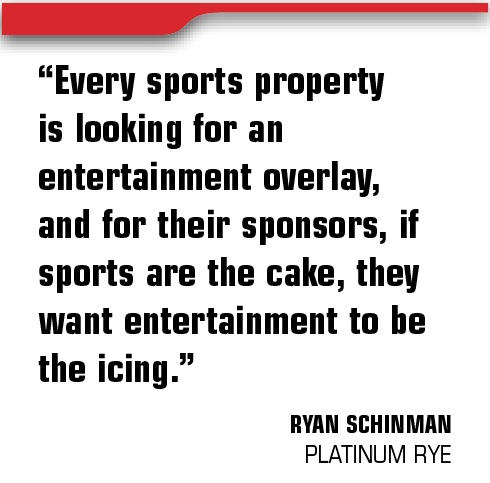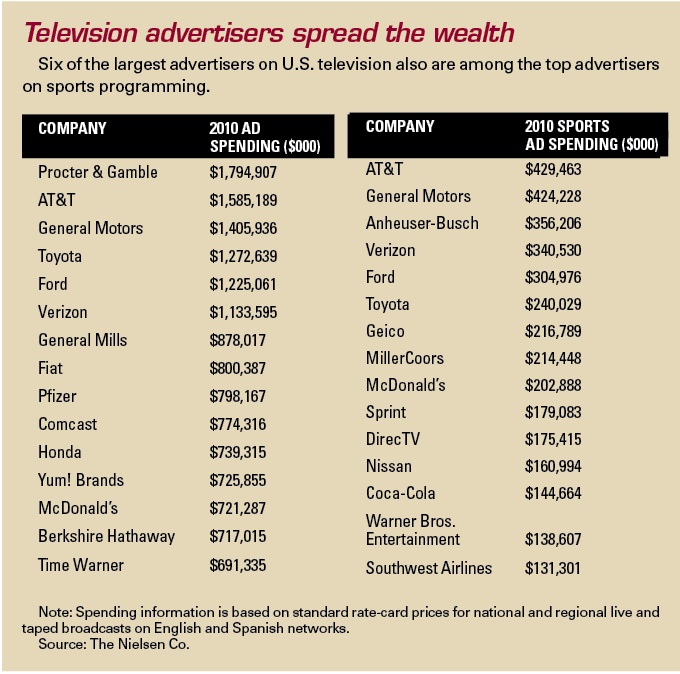When Frank Cooper signed on Pepsi as a lead sponsor of Fox’s new “X Factor” talent competition show this year, the beverage and snack food marketer got prime ads, and logo and product placement. Still, that wasn’t enough for Pepsi, which is trying to answer Coca-Cola’s powerful ground-floor sponsorship with “American Idol.’’
It was a question of adding value to what was a heavy investment even for a marketer the size of $60 billion Pepsi. So Pepsi added a connection to the NFL, its most powerful sports property, offering the winning contestant a Super Bowl ad appearance to match the $6 million recording contract from Sony.
“We wanted to get in the fabric of the show by offering the biggest prize that no one else could,” said Cooper, PepsiCo’s chief engagement officer.
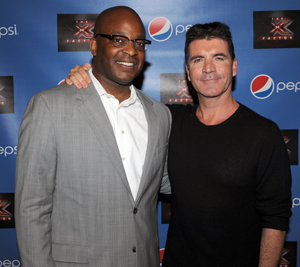 |
PMKBNC
Pepsi’s Frank Cooper poses with “The X Factor’s” Simon Cowell. Cooper built a powerful platform through the brand’s ties to the show and the NFL. |
The result was a mixture of Pepsi’s biggest sports and entertainment marketing assets at a time when the two worlds are affecting each other more than ever.
“When it’s a question of using a sports or entertainment platform, we ask ourselves which will have the greatest impact on popular culture,” Cooper said. “In this case the answer was sports and entertainment.”
However, it isn’t always an integrated effort. The same marketers that buy sports assets are now selling or buying entertainment.
Platinum Rye CEO Ryan Schinman started his career as a sports agent, and his firm still does deals with names as big as Michael Phelps (Head & Shoulders) on the sports side, and Madonna and Motorola on the entertainment side. However, after 20-plus years in both worlds, Schinman says sports properties and their sponsors are looking to balance sports with entertainment.
“Every sports property is looking for an entertainment overlay, and for their sponsors, if sports are the cake, they want entertainment to be the icing,” Schinman said.
While it’s difficult to match the reach of a large sports property with even the biggest entertainment option, several factors are pushing entertainment to the forefront. For starters, there’s a new willingness from the biggest film stars and musicians to cut marketing deals.
Everyone in America with a marketing title has been hearing “content is king” since the original Internet bubble of the late ’90s. Now the growing influence of social media has increased that content imperative tenfold. At a time when NFL rights deals can go for billions, entertainment content, even proprietary entertainment content, is generally easier and cheaper to acquire than top-flight sports content. Even the biggest Olympic or NFL sponsors can’t pay enough to persuade the International Olympic Committee to stage another Games or the NFL to hold another round of playoffs.
Private concerts for buyers and VIPs, along with an exclusive product window, are a routine part of deals like The
Eagles’ hookup with Wal-Mart, not coincidentally, the country’s largest music retailer. At a time when “multiplatform marketing” is more often buzzword than reality, entertainment offers an easier path to the often invoked but seldom realized goal of “360-degree branding.”
“If a brand has a musical act under contract, it can license their music or likeness in an ad, sponsor a tour, and I can create proprietary content, including new music or a performance,” Schinman said. “There’s a lot you can do to create something unique and powerful that will benefit both the brand of musician and sponsor — that’s very difficult to get done with a sports-only platform.”
Sports losing ground?
What’s hard to determine is whether entertainment is gaining at the expense of sports, especially when most large brands employ a mix.
“Sports and entertainment marketing budgets are impacting each other more than ever,” said former Pro Serv and SFX Sports naming-rights lead executive Russell Wallach, now president of Live Nation Network, which sells sponsorships to the likes of Coca-Cola, Anheuser-Busch and UPS across an amalgam of venues, artists, tours, digital and mobile assets.
“We’re talking to the same decision-makers they are in sports,” Wallach said. “The biggest difference is that most big brands are accustomed to spending on TV, and sports have an incredible television platform, which music just doesn’t have. What music and most entertainment options can provide is tremendous flexibility and powerful social media connections.”
Added Todd Goldstein, president of AEG Global Partnerships: “Music marketing is growing now the way sports marketing was 20 years ago. It’s about more precise targeting. You know the NFL will get you almost every age and demo. If you want to laser in more, we can get you older with an Elton John tour or younger with Justin Bieber.”
Agencies from both the sports and entertainment sides are eyeing the other side. Burns Entertainment & Sports Marketing, an Evanston, Ill., company that matches celebrities with brands, flipped its name to put entertainment first more than a decade ago because the trend was already clear. While some of the largest individual endorsement deals remain in sports, over the past 15 years, Burns’ business has shifted from 75 percent sports to 85 percent celebrities.
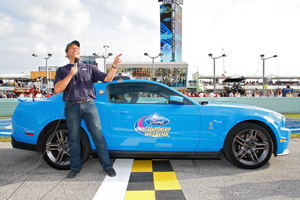 |
GETTY IMAGES
TV personality Mike Rowe has an endorsement portfolio that includes the likes of Ford, Viva paper towels, Lee Jeans and Motorola. |
“You’ve got exceptions like Peyton Manning or Derek Jeter, of course, but even the biggest actors and musicians are more willing to do endorsements. There’s just more kinds of celebrities in the mix now,” said Burns President Doug Shabelman, citing reality show stars like Mike Rowe of Discovery Channel’s “Dirty Jobs,” who has endorsements with Ford, Viva paper towels, Lee Jeans and Motorola. He said the greater pool of entertainment celebrities, and their greater mix of price points for endorsements, provide more options for brands.
While Pepsi’s media and marketing ties with the “X Factor” are said to total $60 million, most of the largest entertainment deals do not approach the size of the largest sports marketing deals. However, they have drawn the interest of those marketers steeped in sports.
Octagon CEO Rick Dudley notes that while the company already has an athletes and personalities division, the First Call celebrity endorsement division, and Hollywood public relations shop Rogers & Cowan under its aegis, entertainment marketing remains an area ripe for acquisition. Dudley estimated Octagon’s mixture of sports to entertainment business at around 80/20, probably growing to 70/30. Five years ago it was 95 percent sports.
Scheduling difficulties
To some extent, the ephemeral nature of entertainment works against it being marketing friendly, at least relative to sports. Movies, plays, concert tours, TV shows, many are like the circus — here and gone. Large marketers, such as Coca-Cola, Anheuser-Busch and Procter & Gamble, have marketing agendas planned 18 to 24 months in advance. In recent years, large sports properties have started to match those efforts with long-term marketing calendars of their own. In entertainment, not so much — at least not yet.
“How do you put together a marketing calendar with the required lead time in the entertainment space?” Dudley said. “That’s the biggest challenge. In sports, you know the schedule.”
Echoed Peter Murray, a former NFL marketer, now a senior vice president at William Morris Endeavor: “Sports
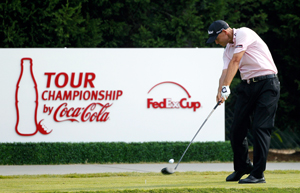 |
GETTY IMAGES
Since brands often plan their marketing campaigns 18 to 24 months in advance, sports provide well-defined calendars that tailor well to their needs. |
marketing is a very mature, proscribed world. Entertainment is far less structured and all these creators now want to figure out how they can work more with brands. So on the TV side, you are seeing more build-out of partner development capabilities. The problem is, a lot of them tend to have an opening for a brand now and that’s not the way brands work, which is 18 months out. Without that kind of structure, entertainment marketing won’t get to where it needs to be.”
Then there’s the matter of seasonality. Given their scheduling, sports can offer definitive seasonality. The NFL’s dominance during the two most important times of the retail calendar — back-to-school and holiday shopping — is an integral, but often overlooked reason for its commercial success. However, entertainment figures are almost never out of season and the number of events can be astounding. Such is the case with Feld Entertainment’s 5,000 global events annually for its collection of properties, including Disney On Ice, Monster Jam and the Ringling Brothers and Barnum & Bailey Circus.
“The size of our offerings is often surprising to people we’re selling to, and I’m calling on lots of the same brands that I used to,” said Jason Bitsoff, a former sponsorship marketer with the Houston Rockets and Nashville Predators, who is now vice president and general manager of sponsorship and strategic alliances at Feld Entertainment.
So you have the malleability of the entertainment world countered by the comfort level and relative ease of sports deals.
“It’s a more structured world, so sports deals are generally easier,” said Mark Zablow, senior director of marketing at Platinum Rye. “The other side is that there are generally fewer opportunities in entertainment for a competitor to buy a piece of what you are trying to stake out as your own.”
Live Nation’s Wallach also has instituted structural changes. “I learned growing up in sports that sports properties do a great job managing relationships with their clients,’’ he said. “So we’ve built a huge account management/marketing group, which is generally unusual on the entertainment side.”
How akin the two worlds are or can be in marketing terms depends on who you talk to.
“At the core of sports and entertainment marketing, you are trying to connect to fans of live events and show that a particular brand is a ‘fan of the fans,’” said Chris Monaco, vice president of Octagon music and entertainment, which activates entertainment on behalf of many of its largest sports clients, including MasterCard. “But it isn’t a zero-sum game. We see the overall [sports and entertainment] pie getting bigger; we’re not seeing addition by subtraction.”
While Subway has some entertainment efforts, usually they involve putting some of its athlete endorsers under an entertainment spotlight, like Blake Griffin in a “Funny Or Die” video.
“From a creative perspective, if we’re doing something with a healthy message, athletes will always work,” said Subway CMO Tony Pace. “Looking at one versus the other in terms of a large investment, there just aren’t the same kinds of tent poles in entertainment there are in sports. Within reason, we always know what our audience will be within our sports [media] buys. For a lot of larger brands, there is just more comfort with sports, because there isn’t as much variability.”
Not that entertainment isn’t changing. Financial pressure on the recording industry has made it more marketing friendly than ever, and a business once dominated by record labels is being redefined.
“Labels have lost their clout and to some extent, their reason for being,” said Joe Killian, senior vice president of music and entertainment at Momentum Worldwide. “The reason you needed a label before was you needed a studio to record in and distribution capabilities. Now every musician has both on his Mac.”
Accordingly, there are some profoundly different marketing programs that see fans consuming music in entirely new ways for the benefits of sponsors. American Express cleverly extended its heritage program of affording cardholders early access to entertainment tickets with its “Unstaged” live video streaming of concerts that pairs bands with top directors. David Lynch directed Duran Duran’s live stream, Spike Lee directed John Legend, and Terry Gilliam directed a concert with Arcade Fire.
AmEx cardholders could pick a camera angle unavailable to others, while all viewers could vote for the encore. During the Arcade Fire concert, card members were able to send in their photos of the suburbs that were shown onstage during the song of the same name. Since big-time sports are unscripted and rights are far more complex, it’s hard to imagine something like that happening in sports.
Consequently, even technology sponsors like wireless, one of the largest sponsor categories, continues to use something as last century as text-to-win as a preferred way to leverage sports sponsorship investments.
Build your own
Sometimes it gets down to building versus buying in entertainment, just as it does in sports.
 |
GETTY IMAGES
Verizon’s work building and sponsoring the “How Sweet the Sound” gospel music competition helped build an affinity between the brand and African-American consumers. |
Momentum Entertainment Group President Steve Marrs notes Red Bull’s prowess in creating proprietary sports events, but says there’s ample room for creativity within entertainment. He noted Verizon’s work sponsoring and building the “How Sweet the Sound” gospel music competition that has served to coalesce what once was a regional, grassroots scene, while fostering an affinity between African-Americans and Verizon.
“There’s still so much room on the entertainment side, and that can and should benefit the brand involved,” Marrs said.
Finding a path through the byzantine maze of entertainment marketing options isn’t easy, so as Pepsi’s Cooper advises, “Get yourself some expertise quickly, because in entertainment perhaps more than sports it is difficult to know exactly who owns what.”
Probably because they own the bricks and mortar, venue owners like AEG have cut some of the larger marketing deals within music. MetroPCS cut its sponsorship of the current Enrique Iglesias tour with AEG rather than with the performer directly.
“It might have cost a little more, but we have a high level of confidence with the AEG guys when it comes to marketing needs,” said Kern Egan, principal at Richards Sports & Entertainment, which did the deal for MetroPCs.
If entertainment, especially live music, is like sports 20 years ago, how much entertainment will resemble sports in another few decades is a question every marketer is asking.
“My professional background is music and entertainment,” said Momentum’s Killian, “but from my limited experience with sports marketing, I’ve found most of the managers there have gone to university and have law degrees. That’s not so in the music business, at least not yet. As that becomes true, you’ll see it become more like sports from a marketing perspective; it’s already happening.”



